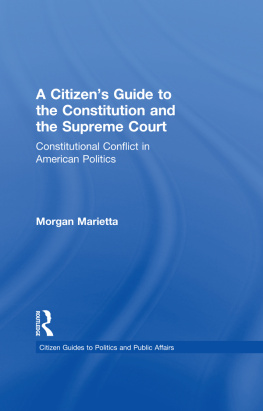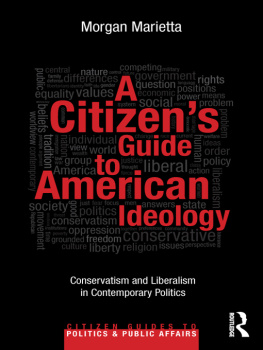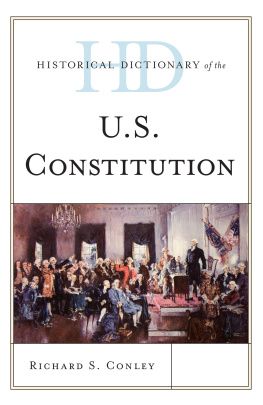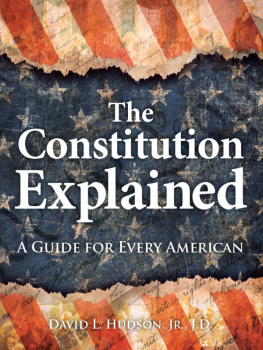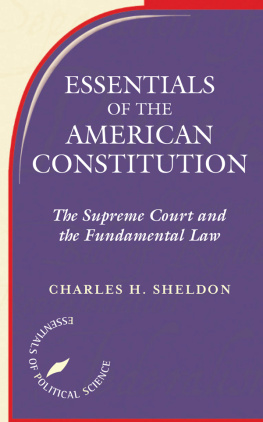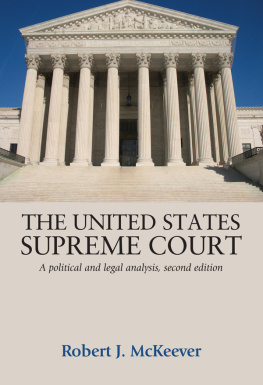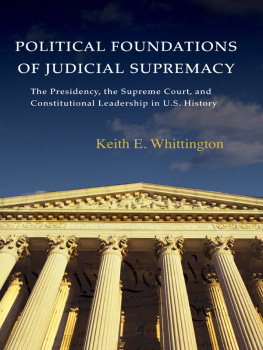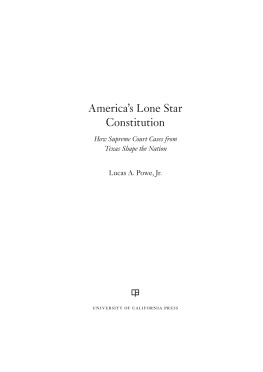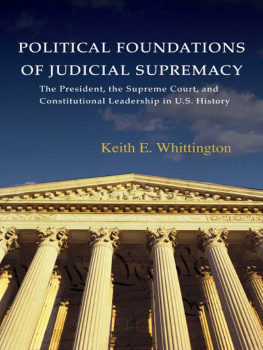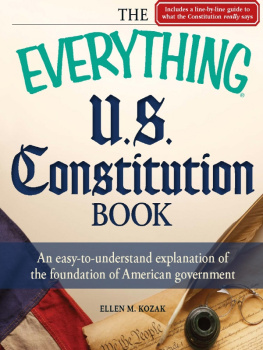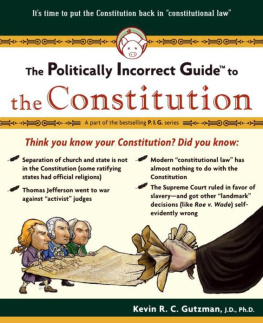A CITIZENS GUIDE TO THE CONSTITUTION AND THE SUPREME COURT
The U.S. Constitution is a blueprint for a free society as well as a source of enduring conflict over how that society must be governed. The competing ways of reading our founding document shape the decisions of the Supreme Court, which acts as the final voice on constitutional questions. This citizens guide explains the central conflicts that frame our constitutional controversies, written in clear non-academic language to serve as a resource for engaged citizens, both inside and outside of an academic setting.
After covering the main points of conflict in constitutional law, Marietta gives readers an overview of the perspectives from the leading schools of constititional interpretationTextualism, Common Law Constitutionalism, Originalism, and Living Constitutionalism. He then walks through the points of conflict and competing schools of thought in the context of several landmark cases and ends with advice to readers on how to interpret constitutional issues ourselves.
Morgan Marietta is Assistant Professor in the Department of Political Science at the University of Massachusetts Lowell. He is the author of A Citizens Guide to American Ideology and The Politics of Sacred Rhetoric.
CITIZEN GUIDES TO POLITICS AND PUBLIC AFFAIRS
Morgan Marietta and Bert Rockman, Series Editors
Each book in this series is framed around a significant but not well-understood subject that is integral to citizensboth students and the general publicfull understanding of politics and participation in public affairs. In accessible language, these titles provide readers with the tools for understanding the root issues in political life. Individual volumes are brief and engaging, written in short, readable chapters without extensive citations or footnoting. Together they are part of an essential library to equip us all for fuller engagement with the issues of our times.
TITLES IN THE SERIES
A Citizens Guide to American Ideology: Conservatism and Liberalism in Contemporary Politics
Morgan Marietta
A Citizens Guide to the Constitution and the Supreme Court: Constitutional Conflict in American Politics
Morgan Marietta
First published 2014
by Routledge
711 Third Avenue, NewYork, NY 10017
Simultaneously published in the UK
by Routledge
2 Park Square, Milton Park, Abingdon, Oxon OX14 4RN
Routledge is an imprint of the Taylor & Francis Group, an informa business
2014 Taylor & Francis
The right of Morgan Marietta to be identified as author of this work has been asserted by him in accordance with sections 77 and 78 of the Copyright, Designs and Patents Act 1988.
All rights reserved. No part of this book may be reprinted or reproduced or utilised in any form or by any electronic, mechanical, or other means, now known or hereafter invented, including photocopying and recording, or in any information storage or retrieval system, without permission in writing from the publishers.
Trademark notice: Product or corporate names may be trademarks or registered trademarks, and are used only for identification and explanation without intent to infringe.
Library of Congress Cataloging in Publication Data
Marietta, Morgan.
A citizens guide to the Constitution and the Supreme Court : constitutional conflict in American politics! Morgan Marietta.
pages cm. (Citizen guides to politics and public affairs)
Includes bibliographical references.
1. Constitutional law-United States. 2. Judicial reviewUnited States. 3. United States. Supreme Court. I. Title.
KF4550.Z9M275 2013
342.73dc23
2013002946
ISBN: 978-0-415-84379-9 (hbk)
ISBN: 978-0-415-84381-2 (pbk)
ISBN: 978-0-203-75577-8 (ebk)
For Jordan
A Note on Capitalization and Italics
The capitalization of terms related to the Supreme Court is not uniform in American publications. The rule I have followed is foremost show respect. Terms such as the Supreme Court, the Court, andJustices are capitalized, as are the schools of constitutional interpretation such as Living Constitutionalism and Originalism. Italics are employed to emphasize some of the major points and concepts, making the text easier to read. They are also employed to delineate questions (for example, the constitutional question is Does the document include a right to privacy?).
This book originated in a class at the University of Georgia in the spring of 2011. The discussions and debates in those sessions shaped this volume into its current form. A group of outstanding students read chapters of the manuscript and met to discuss its progress. Without their many excellent suggestions this would be a much poorer volume. Special thanks go to the sharp minds of
Will Burgess,
Robert Daniel,
Wells Ellenberg,
Stephen Flowers,
Mark Neufeld,
Jett Puckett,
John Shapiro, and
Jordan Stevens.
I am also indebted to Nathaniel Ament-Stone for his valuable commentary; Andrea Briscoe for editing the manuscript; Karli Hedstrom for several invaluable conversations about the Constitution; Heather Hensley for her contributions to my thinking on the common law; Robert Holzbach for cutting the manuscript down to size; Glenn Kent for his comments on each of the chapters; and Kate Tummarello for her insights into the role of premises in constitutional interpretation.
I would also like to thank David Barker, Jeff Condran, Sam DeCanio, and Robert Peluso, as well as Abby Williams and the rest of the clan, including Alix, Dan, Justin, David, and Ken.
My teachers in constitutional law and legal history contributed a great deal to the development of this volume, including Larry Baum, Les Benedict, Bert Carroll, Peter Karsten, and Shannon Smithey.
Many thanks are due to Michael Kerns at Routledge Press, who supported this series and its goal of speaking to a broad audience about essential political questions. My friend and colleague Bert Rockman was also instrumental in making the series possible.
As always, I am indebted to Mark Perlman, who began my journey toward asking the right questions. He is missed as much as he was admired.
The final acknowledgement is the one I most want to make, to the one who made everything different. Because of you this life is more than I had ever dreamed possible. For making this a better book, making mine a better life, and making me a better man, I will be forever thankful. This book, and everything else, is forJordan.
In American politics everything comes down to the Constitution. No one disputes its status as the basic document that describes our system of government, yet we disagree about what it means. And the Supreme Court is the final voice on its meaning.
This brief volume is about our competing interpretations of the Constitution, focusing on why reasonable people disagree and what is at stake in the Supreme Courts decisions. The book begins by identifying the points of conflict that are at the heart of our divisions over the meaning of the Constitution and ends with some of the most important decisions the Court has made in recent years. The disagreements over the meaning of the Constitution are easier to understand through these real-world controversies. The first case we will discussone that illustrates some of the most important aspects of how the Court analyzes constitutional questionsis known as the Bong Hits forJesus Case.
One of the core skills in describing a constitutional conflict is rendering the

